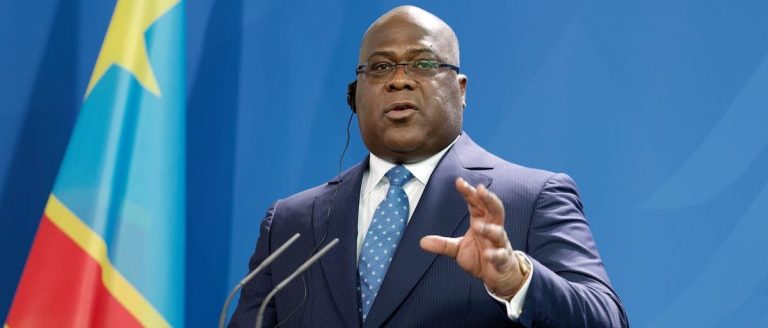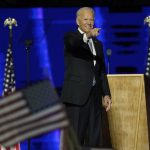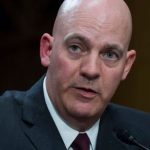DRC’s President Félix Tshisekedi has ended the 16-month coalition with former president Joseph Kabila. Tshisekedi further threatened to dissolve the national assembly in case he does not get the parliamentary majority he seeks to take control of the government. According to the constitution, the president, cannot dismiss the prime minister. So, he will now seek to obtain the resignation of Sylvestre Ilunga, who is a member of the opposition, led by Kabila. The Kabila’s Common Front for Congo (FCC) rejects the President’s announcements. Thus, the struggle to shift the parliamentary majority in the national assembly from Kabila’s camp to that of Tshisekedi, risks plunging the country into chaos.
Tshisekedi has been president of the mineral-rich DR Congo since he won the election in 2018 during the country’s first peaceful transition of power since gaining independence from Belgium in 1960. But Tshisekedi’s supporters say the coalition government between his parliamentary alliance, Heading for Change (CACH), and ex-President Kabila’s FCC, has straitjacketed his leadership.
FCC said it still held more than 300 seats in the 500-seat parliament and has accused Tshisekedi supporters of trying to bribe the MPs to switch parties.
Kabila ruled the DRC for 18 years until he stepped down after long-delayed elections in December 2018. Kabila retains considerable clout through political allies and officers he appointed to the armed forces. He is also a senator for life. He maintains a considerable hold over the country’s politics with the number of seats his party holds in parliament and share of ministerial posts.
Thus, Tshisekedi is seeking allies to help free himself from the grip of former president Joseph Kabila and his Common Front for Congo (FCC) coalition. The grouping controls the National Assembly and most of the country’s provincial governorships.
The FCC and Kabila are criticizing Tshisekedi for allegedly violating the DRC’s constitution in the way he appointed constitutional and appeal court judges. Tshisekedi and Kabila are believed to have signed a secret deal in January 2019, for a coalition government which has established two centers of power led by each of them. So Tshisekedi is struggling to escape the shackles of a deal gone bad with the DRC’s former president.
So he had already challenged the FCC’s dominance with his appointments to the constitutional court and electoral commission.
By ruining the coalition Félix Tshisekedi have closed any possibility for negotiations between the Common Front for Congo (FCC) of former president Joseph Kabila and the Cape for Change who will become adversaries again.
The country faced the prospect of wasting five years of a Tshisekedi presidency characterized by power battles in Kinshasa, while developmental and security problems worsened.
Tshisekedi further threatened to dissolve the national assembly in case he does not get the majority he seeks.
The president, who cannot dismiss the country’s prime minister, according to the Congolese constitution, will now seek to obtain his resignation. However, it is not certain if Prime Minister Sylvestre Ilunga, a member of the FCC, will easily give up. According to the Common Front for Congo (FCC), Tshisekedi’s declaration was “a flagrant and intentional breach of the constitution.” Chaotic scenes erupted in parliament, with lawmakers trashing furniture. In the FCC camp, the executives threaten to initiate legal proceedings against the “corrupt and corrupters” – parliamentarians.
The national assembly, whose president, Jeanine Mabunda is a fervent member of Kabila’s party, will be a battleground. The Tshisekedi camp has designated Jeanine Mabunda as “the enemy number one” who must be “made to pay for her arrogance”.A procedure has been initiated by Tshisekedi supporters in Parliament to remove the bureau of the National Assembly, particularly FCC president Jeanine Mabunda, who has been at loggerheads with Tshisekedi on several occasions. On December 10 two hundred and eighty one out of the 481 MPs voted in favor of moving Mabunda out. This no-confidence vote in Mabunda and her bureau is a good indication that Tshisekedi is likely to succeed in poaching FFC MPs to his side of the house.
Tshisekedi’s success might depend on his ability to gain the support of powerful Congolese politicians such as Jean-Pierre Bemba, Modeste Bahati, and Moise Katumbi.
The president also indicated the possibility of dissolving Parliament and calling for fresh elections if the move to gain a new pro-Tshisekedi majority fails. Tshisekedi hopes his move will reconfigure the political space in Parliament to his advantage.
However, some observers have argued that some MPs are willing to break ranks to support the president’s vision. They suggest that cracks are forming in Kabila’s FCC coalition as some MPs feel their political survival is at stake. Some analysts even believe that the FCC’s grip on key national institutions has been dwindling for some time. DRC’s laws allow neither floor crossing nor party defections during a presidential term.
The FCC has argued that there’s no ‘persistent crisis between government and Parliament’ that would justify dissolving the National Assembly. They also indicated that general elections would need to be held, not just parliamentary ones.
The opposition could use the narrative that Tshisekedi didn’t win the 2018 vote outright. There was this very peculiar situation where Kabila’s party ended up rigging the vote to support Tshisekedi as an opposition candidate. The main problem now is how is Tshisekedi supposed to govern when the basis of his authority is under the question? Thus, President Tshisekedi is probably not that serious about having fresh elections. With a parliament heavily favoring Kabila’s faction, Tshisekedi’s success depended on him not being seen to oppose Kabila too much.
The FCC will try to hold on to what is still their parliament. The Prime Minister [a Kabila’s ally] is probably not going to resign, which will surely lead to a new crisis.
The current political crisis might be decided by military intervention. Recent reshuffling of senior army officers and a ceremony held to renew army loyalty to state institutions send a clear message to Kabila and will test his hold over the security apparatus. Tshisekedi might also rely on new political allies such as Jean-Pierre Bemba and Moïse Katumbi, who were quick to praise the 6 December decision to end the ruling coalition.
Tshisekedi has now drawn a line in the sand. His speech opened a new battlefront in the DRC and the country has effectively descended into political crisis. Violence that erupted after the announcement of the end of the FCC-CACH coalition shows what could lie ahead.
The split in the ruling coalition is unlikely to produce a leadership committed to reforms.
The best-case scenario
Under the best-case scenario, the decision could pave the way for a realignment of political forces with leaders more inclined towards governance and service delivery rather than accumulating power. But the complexity of the process makes it iffy.
The worst-case scenario
Under the worst-case scenario, new political conflict could drag on, adding to the deep security concerns in the Kivu and Ituri provinces where foreign and local armed groups remain a serious threat to civilians.
In the short-term, the developments in DRC will be turbulent and the DRC’s partners should be prepared for any surprise. The FCC’s reaction to the presidential address shows that the coalition will not go down without a fight. In a public declaration, FCC spokesperson Néhémie Mwilanya Wilondja took note of the decision and called for the withdrawal of pro-Tshisekedi CACH representatives from regional and provincial governing bodies.
Over the years, violence has been the preferred tool for most political leaders in the DRC to win and maintain power. It remains an option given the volatile security environment, as the links have been established between some political actors and armed groups, still active in the DRC.




